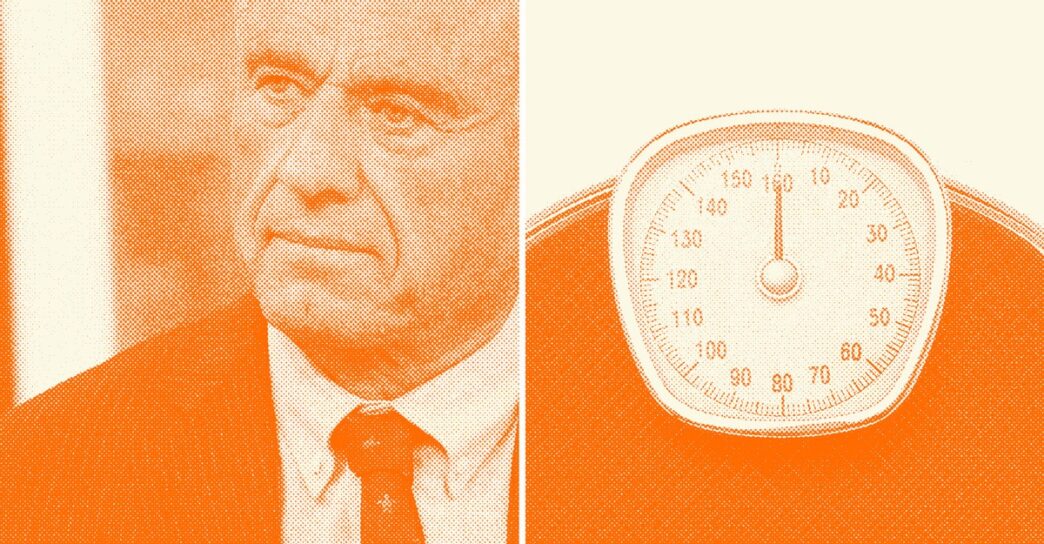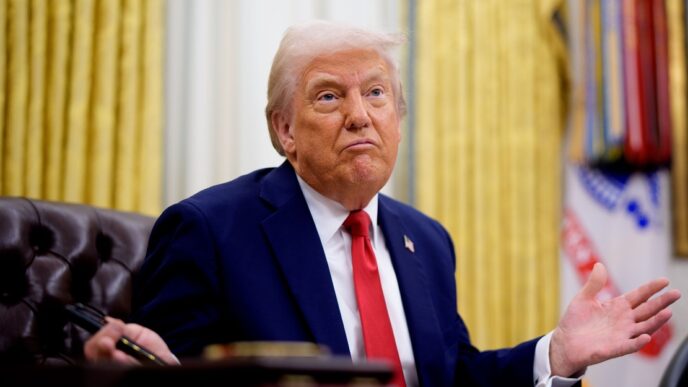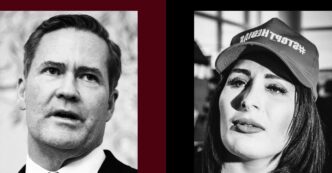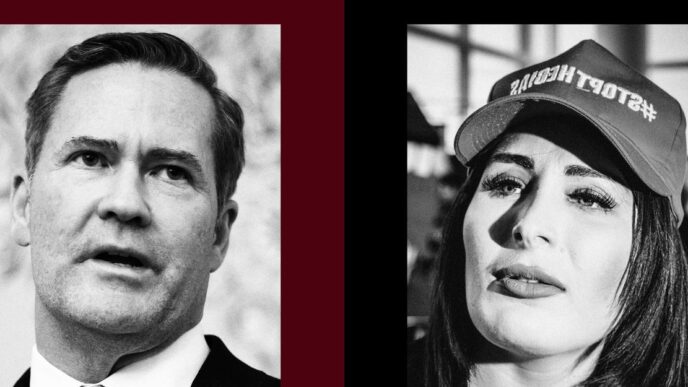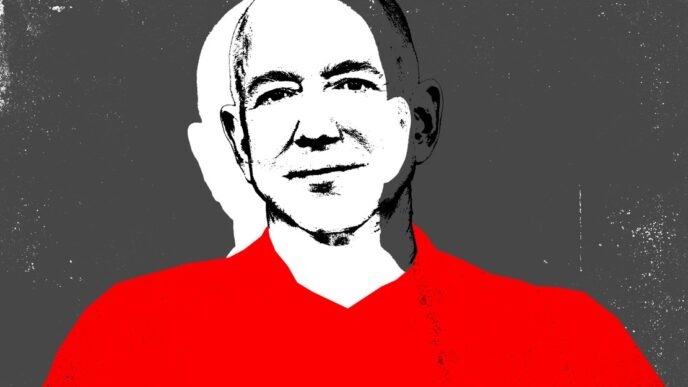This is an edition of Time-Travel Thursdays, a journey through The Atlantic’s archives to contextualize the present and surface delightful treasures. Sign up here.
Last week, at an event in West Virginia, Health Secretary Robert F. Kennedy Jr. fat-shamed the state’s governor, Patrick Morrisey. “The first time I saw him, I said you look like you ate Governor Morrisey,” Kennedy told a laughing crowd. Morrisey has apparently invited Kennedy to be his personal trainer. The health secretary plans to put Morrisey on a “really rigorous regimen” involving monthly public weigh-ins and the all-meat “carnivore diet.” Once Morrisey loses 30 pounds, Kennedy will return to West Virginia for a celebration and final weigh-in.
According to Kennedy, not so long ago, obesity was virtually unheard of. “When my uncle was president, 3 percent of Americans were obese, and today, 74 percent of Americans are obese or overweight,” Kennedy said during his confirmation hearing. This is wrong: In the early 1960s, when John F. Kennedy was president, an estimated 45 percent of Americans were overweight, including 13 percent of whom had obesity. (Such classifications are determined based on body mass index, a flawed but sometimes useful metric). Although RFK Jr. is correct in suggesting that rates of obesity have surged in recent decades, his nostalgia for the past obscures a longer history of America’s struggle with weight-related chronic illness. In fact, RFK Jr. might be surprised to learn that his own uncle once waged a campaign against what he perceived as America’s deteriorating physical fitness.
Anxiety over American obesity dates back to at least the mid-20th century. In 1948—six years before RFK Jr. was born—the founder of Harvard’s nutrition department wrote an essay in The Atlantic warning that obesity was a risk factor for several health conditions including diabetes and high blood pressure. Seven years later—when RFK Jr. was an infant—the renowned nutritionist Jean Mayer declared obesity “a national obsession.” Mayer was particularly frustrated by the barrage of “mercenary lures” that filled the media, advertising ineffective and sometimes harmful “‘health foods’ or ‘thinning foods.’” (RFK Jr.’s endorsement of the carnivore diet and uncorroborated claim that seed oils are “one of the driving causes” of the obesity epidemic come to mind.) Instead, Mayer wrote in The Atlantic, exercise was key to weight loss. We now know that although exercise is crucial for good health, it’s not a silver bullet for treating obesity.
RFK Jr. often refers to his childhood as a sort of golden age for American health. “When I was a kid,” RFK Jr. said at the West Virginia event, “we were the healthiest, most robust people in the world.” But by the time he was of school age, his uncle was leading a national fitness campaign. President Kennedy feared, in particular, that American youth lagged “far behind Europeans in physical fitness.” As evidence, he pointed to a series of strength tests given to children in America, Italy, Switzerland, and Austria: More than one-third of American kids failed at least one test, compared with only 1 percent of European children.
More generally, JFK was worried that an “increasingly large number of young Americans” were “neglecting their bodies” and “getting soft.” In 1961, JFK’s warnings about America’s poor physical well-being led to an Atlantic essay titled “We May Be Sitting Ourselves to Death,” in which a spokesperson for the American Dairy Association fretted over the health of men who spent their days withering away at desk jobs instead of hiking “the dusty trail to bring home the buffalo meat.” (The writer was less concerned about women, who he suggested got plenty of exercise from washing clothes, cooking meals, and picking up after their messy family.) At the time, JFK presented America’s deteriorating health as a matter of Cold War–era national-security concern. As one Atlantic writer explained, “The basic impetus behind this Spartan movement seems to be the fear that the Russians (a vast race of tawny, muscle-bound gymnasts) will someday descend upon our shores and thrash each of us flabby capitalists individually.” America’s growing “softness,” JFK suggested, threatened to “strip and destroy the vitality” of the nation.
Much like the “Make America healthy again” campaign, the JFK-era movement looked nostalgically upon a rustic, heartier past. But even earlier, during the buffalo-hunting 19th century, Americans were anxious about the nation’s declining health. Only four months after this magazine’s first issue, in 1857, one writer complained that the ancient Greek tradition of fitness “seems to us Americans as mythical.” He insisted that a 30-mile walk, five-mile run, or one-mile swim would cost most Americans “a fit of illness, and many their lives.” Even an hour in the gym, the writer worried, would leave any man’s “enfeebled muscular apparatus” groaning “with rheumatism for a week.” One year later, a surgeon argued that busy schedules and “sedentary life” were to blame for the “limited muscular development” of “professional” men. “We live so fast that we have no time to live,” he wrote.
Obesity rates remained relatively stable for 20 years after JFK’s 1960 campaign, before doubling from 1980 to 2000 to what the U.S. surgeon general in 2001 called “epidemic” proportions. Today, 40 percent of U.S. adults meet the clinical definition for obesity. The precise reason for this surge remains unclear, although changing diets and decreased activity levels are thought to play a role. In this particular regard, RFK Jr. is right about America’s declining health. But many other American health outcomes have improved over the decades. Around the time RFK Jr. was born, cardiovascular disease killed Americans at roughly double the rate it does today. Cancer deaths, too, have fallen significantly, thanks to breakthroughs in cancer treatment and a decline in smoking. And that’s not to say anything of the progress made fighting infectious disease earlier in the 20th century.
Yet RFK Jr.’s romanticization of the past has led him to develop an anachronistic approach to health care. He is skeptical of the many advances—GLP-1s, vaccination, milk pasteurization—that have helped improve America’s health over the years. If his intention is to wind back the clock on the American public-health apparatus, he’s off to a strong start. Just this week, he led sweeping cuts across federal health agencies, eliminating thousands of jobs, including the nation’s top tobacco regulator, prominent scientists, and even staffers who focus specifically on chronic-disease prevention. The Department of Health and Human Services was established less than a year before RFK Jr. was born; now he is inviting its destruction. But his efforts to turn back time are foolish. If the golden age of American health exists, it’s in the future, not the past.

